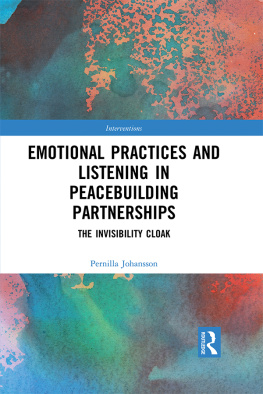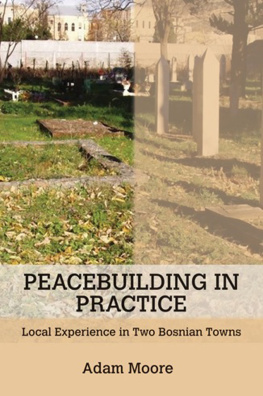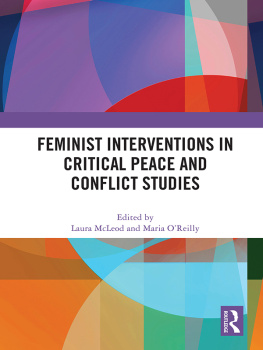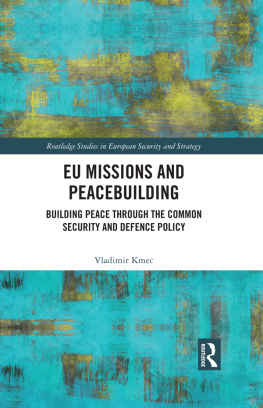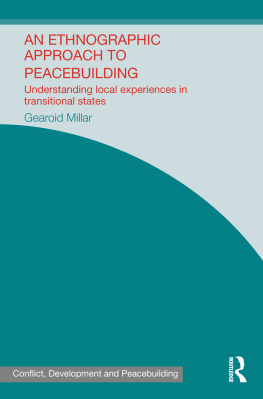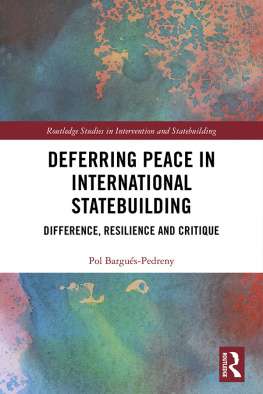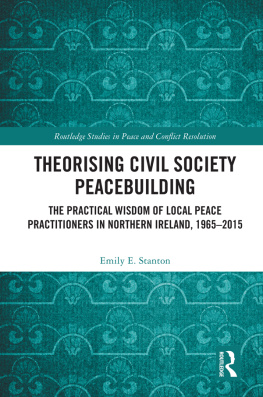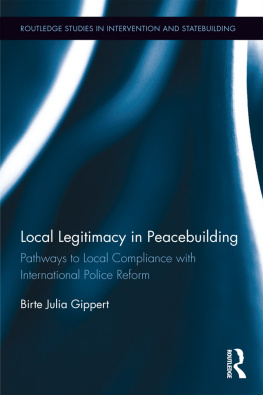Emotional Practices and Listening in Peacebuilding Partnerships
This book analyzes the everyday emotions of international peacebuilding practitioners as practices that hinder and potentially help them to listen more receptively to their local partners. It develops emotional practices as an analytical concept by integrating critical feminist perspectives and cognitive insights into practice approaches.
Effective peacebuilding requires international actors to listen to local partners. This sounds simple enough but often fails in practice. Examining how everyday emotions help or hinder internationals receptivity to local perspectives, the book challenges the conventional wisdom that emotions do not matter at least not those of internationals who are the privileged party in peacebuilding partnerships. The book is based on interviews with peacebuilding practitioners, donors and researchers working in the Balkans and East Africa, as well as in the UK, the US, and Sweden, and gives a detailed and no-nonsense description of daily dilemmas regarding listening and partnerships. Johansson provides concrete recommendations of how internationals can practice personally, organizationally, and geopolitically to build emotional capacity that will help them listen better to local actors.
Drawing on the authors expertise in political science and peace and conflict research, this volume speaks to scholars in international relations, political theory, sociology, cultural studies, development studies, critical theory, and anthropology.
Dr Pernilla Johansson has worked professionally in civil society peacebuilding since her first assignment in Kosovo in 2004, including several senior management positions. She has a PhD in political science from the University of California, Irvine, and has published both academically and popularly on peacebuilding, democracy, embodied practices, cycling activism in LA, and peace activism in Serbia. Her focus areas in research and practice involve learning and culture in organizations working for social change. Since April 2021 Dr Johansson heads the Swedish aid agency's center for capacity building, Sida Partnership Forum.
Interventions
The Series provides a forum for innovative and interdisciplinary work that engages with alternative critical, post-structural, feminist, postcolonial, psychoanalytic and cultural approaches to international relations and global politics. In our first 5 years we have published 60 volumes.
We aim to advance understanding of the key areas in which scholars working within broad critical post-structural traditions have chosen to make their interventions, and to present innovative analyses of important topics. Titles in the series engage with critical thinkers in philosophy, sociology, politics and other disciplines and provide situated historical, empirical and textual studies in international politics.
We are very happy to discuss your ideas at any stage of the project: just contact us for advice or proposal guidelines. Proposals should be submitted directly to the Series Editors:
- Jenny Edkins (jennyedkins@hotmail.com) and
- Nick Vaughan-Williams (N.Vaughan-Williams@Warwick.ac.uk).
As Michel Foucault has famously stated, knowledge is not made for understanding; it is made for cutting In this spirit The Edkins Vaughan Williams Interventions series solicits cutting edge, critical works that challenge mainstream understandings in international relations. It is the best place to contribute post disciplinary works that think rather than merely recognize and affirm the world recycled in IR's traditional geopolitical imaginary.
Michael J. Shapiro, University of Hawaii at Manoa, USA
Edited by Jenny Edkins, Aberystwyth University and Nick Vaughan-Williams, University of Warwick
Emotional Practices and Listening in Peacebuilding Partnerships
The Invisibility Cloak
Pernilla Johansson
Subversive Pedagogies
Radical Possibility in the Academy
Claire Timperley and Kate Schick
For more information about this series, please visit: https://www.routledge.com/series/INT.
First published 2022
by Routledge
2 Park Square, Milton Park, Abingdon, Oxon OX14 4RN
and by Routledge
605 Third Avenue, New York, NY 10158
Routledge is an imprint of the Taylor & Francis Group, an informa business
2022 Pernilla Johansson
The right of Pernilla Johansson to be identified as author of this work has been asserted by her in accordance with sections 77 and 78 of the Copyright, Designs and Patents Act 1988.
All rights reserved. No part of this book may be reprinted or reproduced or utilised in any form or by any electronic, mechanical, or other means, now known or hereafter invented, including photocopying and recording, or in any information storage or retrieval system, without permission in writing from the publishers.
Trademark notice: Product or corporate names may be trademarks or registered trademarks, and are used only for identification and explanation without intent to infringe.
British Library Cataloguing-in-Publication Data
A catalogue record for this book is available from the British Library
Library of Congress Cataloging-in-Publication Data
A catalog record has been requested for this book
ISBN: 978-1-032-06050-7 (hbk)
ISBN: 978-1-032-06051-4 (pbk)
ISBN: 978-1-003-20046-8 (ebk)
DOI: 10.4324/9781003200468
This book is based on my dissertation and therefore its ridiculously long acknowledgements could quite simply be copied here as I have been reminded of all you people while working on the book. (Not to mention those I forgot then the beer offer still stands!) Still, I want to emphasize a few people who have really been at the heart of getting this done, then and now.
First, I would like to deeply thank all the people who participated in the research through interviews, observations, or informal talks about their work and views of peacebuilding and partnerships. Without you, no research, and most definitively no book. This is also the case for my dissertation committee, so thank you Cecelia Lynch, Bronwyn Leebaw, Francesca Polletta, and Keith Topper. Your critical (!) support has been vital to encourage and challenge me to go deeper, think harder and (hopefully) explain better.
My warm thanks also to the series editor Jenny Edkins, who believed I could say something interesting and made it sound so easy to write a book, and to the Routledge team of Rob Sorsby, Claire Maloney, Hamish Ironside and Dominic Corti, who were so kind to pull me through the confusing process when I realized it wasnt. Their steady guidance made the process more enjoyable than I feared at times. In this process I also got amazingly detailed and engaged feedback from two anonymous peer reviewers, thank you both.
Many friends and colleagues at UC Irvine helped shape the dissertation into a somewhat readable mass, not to mention get me through my grad studies somewhat sane. Several unknowingly lent their names to my pseudonyms, simply because I wanted to feel we were in touch while I was writing. I want to particularly thank John Emery, Melanie Masud, Marcos Scauso, Nikola Bagi, and Tanya B. Schwartz for always being around for personal pep talks as well as professional tough love, my favorite kind.
Speaking of tough love, there is no one who lives this value better than Tiffany Williams, and I dare any university, publishing company, book series, research institution, or academic journal to get her onboard before she is snapped up among the star editors or educators where she truly belongs. She will whip any writer and thinker that you can throw at her into shape. Who else could make your heart melt with comments like yes, these examples are weaker, but the bigger problem is they dont fit your framework, this could be interesting, but its not the argument youve set out to make, or in many sections you write about another topic and then drop a reference to the invisibility cloak, but the work wasnt done prior to draw out this connection? The people I have entertained (sorry, Tiffany!) with her comments have squirmed and laughed, all recognizing the invaluable gift of simply telling it like it is. Thanks, Tiffany. Any deleted commas (about half) are all because of you.

